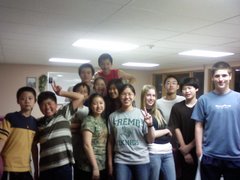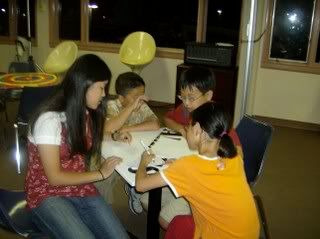Last Sunday morning, I spoke during the adult service. Ahhhh! Scary, I know. I have no idea why my pastor let me do that, but it turned out alright. After much prayer and meditation on what God wanted me to say, I spoke about how God can use us best when we are most reliant on Him.
3 points stem from this:
1) We need a relationship with the Lord.
2) God can work past our doubts and inadequacies.
3) It usually gets worse before it gets better. Especially when it's a big task or purpose.
Plenty of biblical examples and personal accouts from friends to use. From the bible, I chose to talk about Moses and Mary, the mother of Jesus (
Exodus 4:10-17,
7:1-6 and
Luke 1:26-38). After seeing Evan Almighty with the youth group, I gladly referred to the movie a few times as well.
I am taken back to a time in Mexico just at the beginning of my time in high school. We served in a border town, or colonia, but stayed in Texas each night. Every morning we would pray for safe travels and our work that day. Well, one day (I can't remember if it was Wednesday or Thursday) we forgot to pray. Guess which day we had troubles that week...
1) It doesn't matter how long our relationship with the Lord has been going. It doesn't matter what we did in our past. What is important is that our relationship is continually growing and getting more intimate with the Lord. After all, Paul rejected Christ's name and persecuted Christians before his
life-changing encounter on the road to Damascus. Moses killed an Egyptian after watching him beat up a Hebrew (
Ex 2:11-12).
Evan Baxter had virtually no relationship with the Lord. Just a slogan to "change the world" as a newly elected Congressman. As the movie and the building of the ark progressed, so did Evan's relationship and intimacy with God.
The truth is we are all called by God for a purpose. It is up to us to answer that call and follow- just as the disciples had the ball in their court to drop what they were doing and follow Jesus.
2) Moses expressed 5 times to God his doubts and inadequacies!
He complained of being slow of speech and tongue and not an eloquent speaker. I love this part. In Ex 4:14 it says "
the Lord's anger burned against Moses" (emphasis mine). Even though Moses didn't have the confidence of speaking in front of Pharoah with God's help, He still worked around that anyway and sent Aaron with him.
Mary just had one doubt- she was a virgin. Quite reasonable to feel as such. But the angel, Gabriel, explained that the Holy Spirit would come upon her. Mary's answer? "I am the Lord's servant." Sometimes women just get it quicker than men.
I have to admit that I mirror Moses' feelings. I am not an eloquent speaker. Some piece of advice from Pastor Lee came in handy. It actually relates quite well to point #1. "Let the Holy Spirit guide you. Prayer is a 2-way dialogue with God." Which means I need to take time to talk to God and take time to listen as well.
My friend, Matt, was asked to go to Chile a few years ago by his then-pastor. 2 weeks before leaving, his pastor told him that he (the pastor) couldn't go and Matt was quite a bit short financially as well. Uncertain but still reliant on God, Matt prayed whether he was supposed to go or not. A week before the trip, a man approaches Matt and tells him that he is supposed to support him on his trip. He proceeded to write a check for $1000 to Matt. Guess how much money he needed to go on his trip...
3) The Israelites faced harsh conditions under the Egyptians. After approaching Pharoah for the first time, Pharoah made them find their own straw instead of supplying it to them (
Ex 5:6-21). Straw was mixed with mud to make bricks more durable. The Israelites had to find their own straw and keep up the same production level as before (Ex . They were also in fear after being released, as they found themselves in between the Red Sea and Pharoah's army (
Exodus 14).
It's no doubt that both Mary and Evan (from the movie) faced ridicule. I'm not sure exactly how the conversations and insults went, but I'm pretty sure it went something like this. "You're pregnant. You and Joseph aren't even married yet! What's that? The Holy Spirit did it? Riiiiiight. Good one there." And with Evan or Noah... "You're building an ark? It barely rains at all! We don't even need an umbrella here! Yeah, you keep building that ark. We'll just keep doing what we're doing."
It is also important to mention that Mary and Joseph had to escape from King Herod, who ordered the slaying of all boys under 2 in Bethlehem (
Mt 2:13-18).
What does this mean today? Small problems require just small solutions. But bigger problems are bigger opportunities to showcase God's power. Do you wish for big miracles to happen in your life? Let's not forget that through faith in Jesus Christ, we have the miracle of eternal life. Although not quite as visually stunning as turning the Nile into blood, it is no less of a miracle than the plagues God inflicted upon the Egyptians.
In closing, I leave with a thought from Evan Almighty. Evan's family has left him because they do no understand what he is doing. God talks to Evan's wife through a busboy at a restaurant. "If someone asks for courage, does God just give them courage, or the opportunity to be courageous? If someone asks for more time with the family (Evan's wife prayed for this at the beginning of the film), does God just give them happy times, or the opportunity to spend more time together?"
My prayer for all of us is to seize those opportunities, and rely on God as much as we possibly can so He can perform greater works through us.





